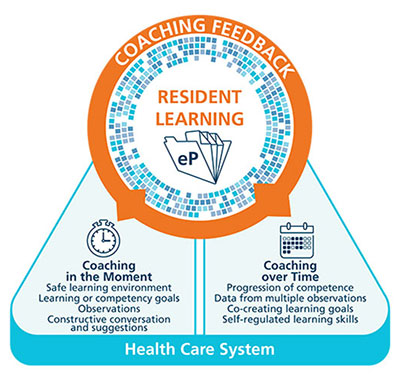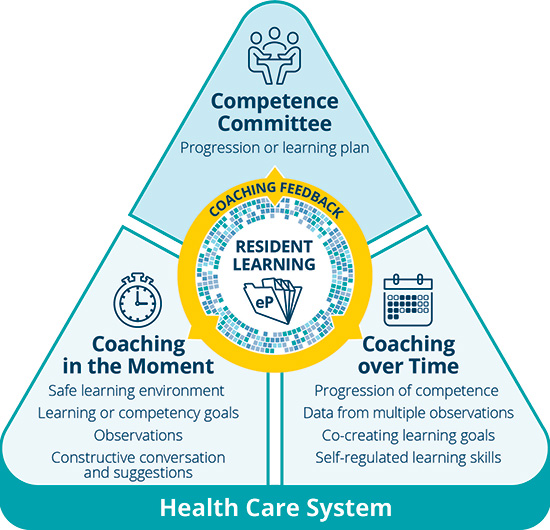CBD and coaching
Understanding the CBD Coaching Model
The Royal College has developed a coaching model to support resident learning.
The CBD Coaching Model is part of an important philosophical shift in thinking about assessment and its purpose. In shifting emphasis from Assessment OF Learning (summative assessment) to Assessment FOR Learning (formative assessment), the Coaching Model uses assessment as a learning tool, not just an evaluation method.
CBD Coaching Resources
CBD Coaching Model PowerPoint Slides
The Competence by Design (CBD) Coaching Model handout (2 pager)
Video Snippet* (01:00) The Coaching Model for CBD
“Coaching to Competence” consists of 5 interactive activities that allow you to practice applying the RX-OCR coaching process. The activities are meant to help you identify gaps in skills and knowledge related to coaching so that you can work to close these gaps through further practice, reflection and other learning opportunities.
This activity is an Accredited Self-Assessment Program (Section 3) as defined by the Maintenance of Certification Program of the Royal College of Physicians and Surgeons of Canada, and approved by Royal College Continuing Professional Development Unit. You may claim a maximum of 30 minutes for each module (credits are automatically calculated).
"The Role of Coaching over Time in Competence by Design" is the first in a series of modules devoted to the topic of Coaching over Time. This module provides you with an understanding around this essential role and the value it adds for resident professional development. It also includes a video interaction that demonstrates the key components for successful Coaching over Time interactions. Claim Section 3 Self-Assessment credits.
*NEW MODULE* “The First Coaching over Time Meeting: Setting the Stage for Success” is a module in the Coaching over Time series. The goal of this module is to prepare you for the critical first meeting with a resident and to help you set the stage for the coaching relationship over time. Claim Section 3 Self-Assessment credits.
*NEW MODULE* “Co-Creating Resident Learning Plans” is a module in the Coaching over Time series. This module helps academic coaches co-create goals and learning plans with their residents and identify barriers and enablers for engaging their residents in developing their individualized learning plans. Claim Section 3 Self-Assessment credits.
The Coaching Model Diagram
The CBD Coaching Model includes 2 coaching components:
- Coaching in the Moment
- Coaching over Time

- Resident learning is positioned at the centre of this new model to reflect the importance of a learner-centred, developmental approach to competency acquisition.
- The Health Care System is the foundational layer in this model, recognizing that resident learning (and coaching) is happening within the workplace of the complex health care system and that real patient care is occurring.
- The bi-directional orange arrows highlight the importance of Coaching Feedback as a conversation between the resident and the clinician that is meant to guide learners through a growth process that leads to performance enhancement.
- The blue pixelated ring denotes the gradual collection of low stakes observations.
- Coaching exchanges and documented summaries help build a complete picture of a resident’s progress, which is stored in the resident’s ePortfolio (eP).
In CBD, clinicians are encouraged to think of themselves as coaches. “Coaching feedback” is a conversation between resident and clinician, and is meant to guide learners through a growth process that leads to performance enhancement. Coaching feedback tells residents what was witnessed during a direct or indirect observation, and, most importantly, focuses on specific actionable suggestions for improvement. In other words, coaching feedback helps a resident understand what adjustments and modifications will allow them to progress to the next level of capability/proficiency.
Coaching in Practice
Coaching in the Moment

Coaching in the Moment requires clinicians to establish rapport and set expectations with their residents, observe the residents doing their daily work, provide coaching feedback, and record the encounter. Frequent observation is a key ingredient in resident learning and assessment.
Coaching in the Moment follows the RX-OCR step-by-step process:
- Establishing educational Rapport between the resident and the clinician (an educational alliance or partnership)
- Set eXpectations for an encounter (discuss learning goals).
- Observe the resident (directly or indirectly).
- Engage in a Coaching conversation for the purpose of improvement of that work (“coaching”).
- Record a summary of the encounter.
Over time, many “Coaching in the Moment” conversations and documented summaries help build a complete picture of a resident’s progress, which is stored in a resident’s ePortfolio (eP) and informs the work of a program’s competence committee.
Coaching Over Time

Coaching over Time requires a longitudinal relationship between a clinical faculty member and a resident. This educational partnership lasts longer than any one clinical experience. It requires regularly scheduled face-to-face discussions about the resident’s progression toward competence. Learning opportunities are planned to address any recognized performance patterns. For an educational partnership to work well, residents must feel confident that the clinician has the resident’s best learning interests in mind.
This component of the model, in particular, focuses on helping the resident become an independent, competent clinician that is prepared for a career as a self-regulated learner.
Coaching and Learner Progression
A modification of the Coaching Model highlights an important relationship between coaching and a resident’s progression through the CBD stages of training.

This “coaching and progression” diagram shows the addition of a competence committee. This addition is meant to illustrate that a competence committee regularly reviews data from multiple EPA and milestone observations to make evidence-informed decisions about when a resident is ready to progress to the next stage of their program.
A resident and their “Coach over Time” will often use competence committee reviews and recommendations to inform the resident’s learning and performance goals.
Acknowledgements
The Royal College would like to thank the following individuals for their assistance in developing the coaching model:
- Denyse Richardson, MD, MEd, FRCPC
- Carol Aschenbrener, MD; Former Chief Medical Education Officer, AAMC (retired); currently Executive Coach
- Farhan Bhanji, MD, MHPE, FRCPC
- Marissa Bonyun, MD, MEd
- Rose Hatala, MD, MSc, FRCPC
- Shelley Ross, PhD
- Joan Sargeant, MEd, PhD
- Shirley Schipper, MD, CCFP, FCFP
- Chris Watling MD, MMEd, PhD, FRCP(C)
Tools and resources
- CBD Coaching Model PowerPoint Slides
- The Competence by Design (CBD) Coaching Model handout (2 pager)
- Video Snippet* (01:00) The Coaching Model for CBD
- Coaching to Competence: RX-OCR
- Workplace-based Assessment Implementation Guide: formative tips for medical teaching practice
- Understanding Workplace-based Assessment and CBD handout
- Competence Committees — Guidelines for the Terms of Reference
- Competence Committees — Process and Procedures in Decision Making: A framework
We are here to help you succeed with CBD. Contact us: cbd@royalcollege.ca